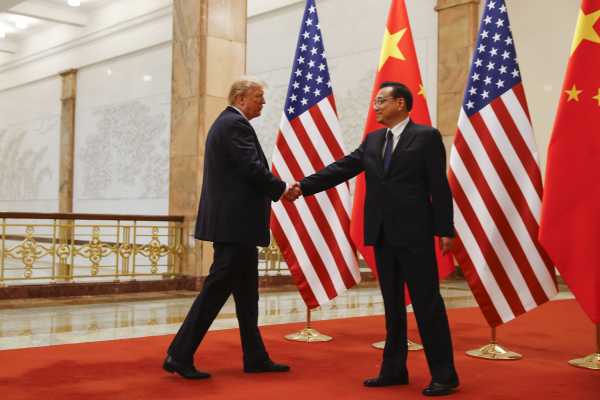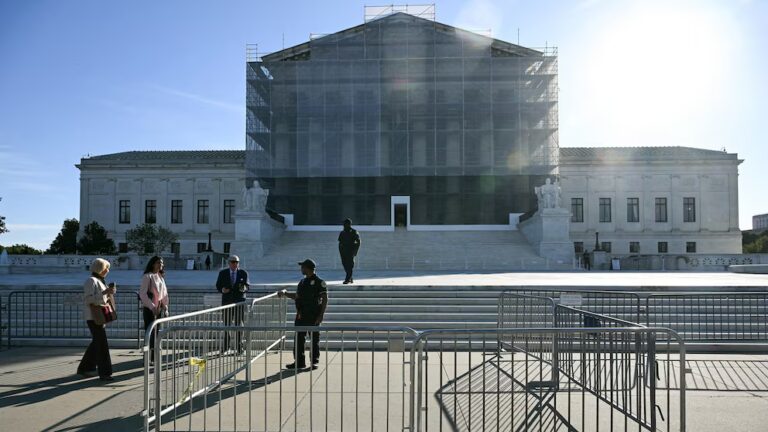
Is the president of the United States revising American trade policy — and possibly jeopardizing national security — because his family received a large cash bribe from the Chinese government?
Under normal political circumstances, it would be an outrageous accusation to level. But under the political circumstances of 2018, there is suggestive evidence that it possibly happened — but the 24/7 din of controversy and scandal means that very little attention is being paid to the possibility. The constant tumult of the Trump Show — who’s leaking, who’s being mean to John McCain’s family, why is the president always lying about golfing, etc. — manages to crowd out not just big-picture policy coverage but also genuine malfeasance that has real, negative impacts on people’s lives.
“The controversies,” David Frum warned a week after Election Day 2016, “will divert you from the scandals.”
And that’s what seems to be going on this week, when two below-the-radar stories — one about hotel financing in Indonesia and one about low-end smartphone sales in the United States — have a striking and potentially quite disturbing intersection. Here’s what we know so far.
ZTE and Lido City: a chronology
ZTE is a Chinese telecommunications equipment manufacturer that, among other things, manufactures Android smartphones, primarily on the cheaper, lower end of the market. Like most big Chinese companies, ZTE has various ties to the Chinese government, and there have long been questions about the security implications of relying on foreign firms with government links for sensitive communications roles. But separate from that longstanding controversy, ZTE had been in intense trouble lately for a largely unrelated issue pertaining to US sanctions policy.
- Back in March 2017, ZTE was hit with a record $1.19 billion fine for violating US law by selling technology products containing US components in North Korea and Iran. The fine set a record both because of the volume of ZTE’s illicit business and because ZTE was found to have tried to deceive US government officials and even its own accounting firm.
- About a year later — on March 12, 2018 — the Trump administration prevented a Singaporean company called Broadcom from buying a US company called Qualcomm. Qualcomm makes chips that are used in many smartphones, and the US government said Broadcom’s links to the Chinese government made it too risky to allow the company to purchase a key player in a strategic industry.
- Then on April 15, the Commerce Department hit ZTE again, saying that despite the earlier fine and settlement, ZTE had continued to violate US sanctions law and lie to the US government. The new order simply barred American companies from selling anything to ZTE.
- On May 8, the Trump administration pulled out of the Joint Comprehensive Plan of Action with Iran and began the process of trying to make US sanctions on Iran even more stringent in hopes of crippling the Iranian economy.
- On May 9, ZTE announced that it was going to have to shut down its entire smartphone business since it had no viable way to continue operating without Qualcomm chips.
- On May 11, a state-owned Chinese construction company called the Metallurgical Corporation of China announced it would float a $500 million loan to Indonesian developers to facilitate the construction of a vast “integrated lifestyle resort” called MNC Lido City that includes Trump-branded hotels, residences, and a golf course.
- On May 13, Trump tweeted: “President Xi of China, and I, are working together to give massive Chinese phone company, ZTE, a way to get back into business, fast. Too many jobs in China lost. Commerce Department has been instructed to get it done!”
- On May 14, Trump tweeted about ZTE again: “ZTE, the large Chinese phone company, buys a big percentage of individual parts from U.S. companies. This is also reflective of the larger trade deal we are negotiating with China and my personal relationship with President Xi.”
Why did Trump change course on ZTE?
It’s of course possible to interpret Trump’s rapid turnabout on the ZTE issue as reflecting what Ana Swanson, Mark Landler, and Keith Bradsher of the New York Times term “another twist in the pitched battle inside the White House between the economic nationalists, who channel Mr. Trump’s protectionist instincts, and more mainstream advisers, who worry about the effects of hard-line policies on the stock market and long-term economic growth.”
But while there clearly are overall disagreements inside the Trump administration about trade with China, the ZTE issue isn’t really a trade policy issue at all. The charge is that ZTE repeatedly and willfully violated US sanctions against Iran and North Korea, sanctions whose integrity is the centerpiece of American policy toward those two countries and increasingly so as a result of Trump’s own moves.
What’s more, back in February, FBI Director Christopher Wray, joined by the heads of the CIA and NSA plus Director of National Intelligence Dan Coats, testified before Congress that it’s a national security risk to let US government employees use phones made by ZTE (or fellow Chinese phone maker Huawei) and that they wouldn’t recommend private citizens do so either. The Defense Department, which is not in the grips of Trump’s weird ideas about how trade works, announced on May 2 that it will ban the sale of ZTE and Huawei phones from military bases because it regards the products as insecure due to the companies’ relationship to the Chinese government.
Trump’s tweets, in other words, aren’t picking a side in an internal disagreement about trade policy. At least, they aren’t just doing that. They appear to involve overruling his whole national security team’s assessment of ZTE’s role in the world. And it happened with no explanation, no background briefing, and seemingly no consultation with the relevant officials.
But it also happened the same week a Chinese state-owned company came through with hundreds of millions of dollars in loans, some of which will go to facilitate the construction of Trump-branded properties in Indonesia.
The Trump administration’s inadequate response
Asked at Monday’s press briefing about the business deal in Indonesia, White House deputy press secretary Raj Shah punted questions to the Trump Organization, saying, “You’re asking about a private organization’s dealings.”
This is a ridiculous answer.
There’s no allegation that the Trump Organization qua private business is doing anything wrong. And the Trump Organization, as a privately held business, has no particular obligation to answer skeptical questions from the public. The obligation to answer questions from the public rests with the White House, and the questionable conduct is on the part of the US president.
Way back in January 2017, Trump attorney Sheri Dillon reassured the public that “no new foreign deals will be made whatsoever during the duration of President Trump’s presidency.”
She was, obviously, misleading people about that and doing so on behalf of Trump. A company that he owns and that is run by his sons — sons who also serve as close political advisers — is doing business all around the world, including with foreign governments, at the same time that Trump is doing multifaceted international negotiations with those same governments.
Many Republicans in Congress are clearly aware that something fishy is happening with ZTE. But while they have extensive oversight powers that could be used to check Trump’s conflicts of interest, they uniformly decline to use any of them, leaving America to depend on nothing more than Trump’s say-so and goodwill for as long as the GOP retains the majority.
Sourse: vox.com





